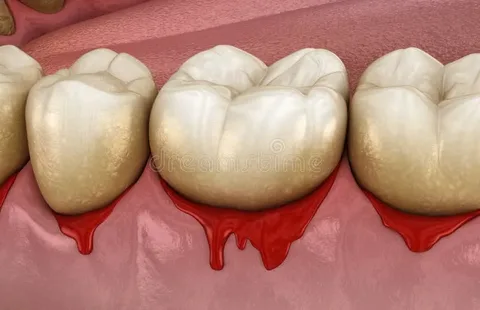Brushing your teeth regularly and flossing are essential for maintaining a healthy smile. But when these simple daily habits are accompanied by bleeding, it can be unsettling.
A little blood might not seem like a big deal at first, but if it happens frequently, it could indicate that something isn’t quite right with your gums. Healthy gums should not bleed easily—even though they are a common issue that many people experience at some point.
While many usually assume that brushing too hard is the main and only cause of bleeding gums, the truth is that there are other reasons that may cause it. Bleeding gums are easy to overlook, but leaving this issue unsolved can lead to more significant problems like tooth loss or gum recession.
So, if you’ve been dealing with bleeding gums, it’s time to dig deeper, and since the first step to fixing a problem is to understand its cause, we will uncover five common reasons behind this issue to help you know how to address and fix it.
Get dental implants that prevent bone loss and help you stay free of gum disease at a leading dental implant clinic in Dubai.
Certain Medications
Some blood-thinning medications, such as antiplatelets and anticoagulants, interfere with the body’s clotting mechanism. When a mouth trauma occurs, these medications reduce the activity of clotting factors, turning a minor gum trauma into noticeable bleeding and prolonging the bleeding time.
Additionally, pre-existing gum diseases like gingivitis or periodontitis can cause inflamed and fragile gum tissues. The inflammation from these diseases weakens the integrity of the blood vessels, which, combined with the effect of blood thinners, increases bleeding risks by preventing these already valuable gum tissues from clotting properly.
Aggressive Tooth Brushing
Brushing your teeth way too hard can do more damage than you think. Aggressive brushing puts your oral health at risk of developing gum recession. In this situation, your gum tissue starts to pull away from your teeth, exposing the roots underneath. Over time, the tissues become weaker, and their protective barrier wears down, making them more prone to irritation and bleeding.
To avoid this condition, switch to a soft-bristle toothbrush or consider using an electric one with a pressure sensor that warns you when you’re overbrushing.
Pregnancy Hormones
It’s no secret that your oral health demands extra care during pregnancy. But what’s the reason? Hormonal changes that occur in these months boost blood flow to the gums, which makes them more sensitive and more vulnerable to plaque and bacteria. As time passes, the tissues might become red, tender, and swollen, and they are more likely to bleed during brushing and flossing.
Smoking
The effects of smoking don’t just stop at staining the teeth; they also extend to your immune system. The chemicals in tobacco weaken the immune system, which means your body won’t be able to fight off infection as effectively as it used to.
Additionally, these chemicals can also reduce blood flow to the gums, increasing the risks of gum disease and inflammation. All of which makes bleeding gums more likely to happen.
Gingivitis
This is the most common cause of bleeding gums. But what exactly is it? Gingivitis is a gum disease that occurs when plaque and bacteria accumulate on the teeth and gumline. If left untreated, plaque hardens into tartar, eventually irritating the gums and leading to redness, swelling, and bleeding.
In conclusion, it is absolutely essential to keep in mind that taking proactive measures, such as maintaining regular oral hygiene practices, consulting with your trusted dentist, keeping routine check-ups, and managing contributing factors like medications or lifestyle choices, can prevent bleeding gums, protect your smile in the long run, and ensure your oral health remains in optimal condition.
Achieve the perfect smile you’ve always wanted at the best dental clinic in Dubai.


